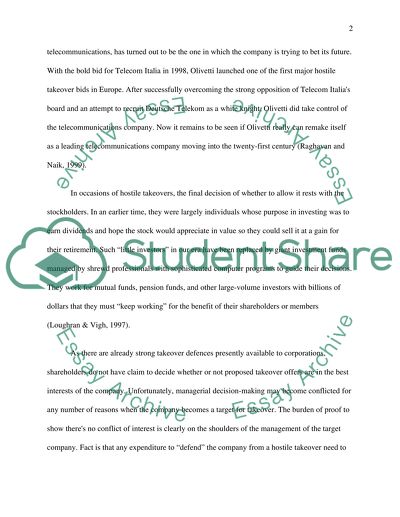Cite this document
(Shareholders' Wealth Consequences for Defeating Hostile Takeovers Case Study Example | Topics and Well Written Essays - 1750 words, n.d.)
Shareholders' Wealth Consequences for Defeating Hostile Takeovers Case Study Example | Topics and Well Written Essays - 1750 words. https://studentshare.org/finance-accounting/1531030-evaluating-the-shareholders-wealth-consequences-in-defeating-hostile-takeovers-of-uk-companies
Shareholders' Wealth Consequences for Defeating Hostile Takeovers Case Study Example | Topics and Well Written Essays - 1750 words. https://studentshare.org/finance-accounting/1531030-evaluating-the-shareholders-wealth-consequences-in-defeating-hostile-takeovers-of-uk-companies
(Shareholders' Wealth Consequences for Defeating Hostile Takeovers Case Study Example | Topics and Well Written Essays - 1750 Words)
Shareholders' Wealth Consequences for Defeating Hostile Takeovers Case Study Example | Topics and Well Written Essays - 1750 Words. https://studentshare.org/finance-accounting/1531030-evaluating-the-shareholders-wealth-consequences-in-defeating-hostile-takeovers-of-uk-companies.
Shareholders' Wealth Consequences for Defeating Hostile Takeovers Case Study Example | Topics and Well Written Essays - 1750 Words. https://studentshare.org/finance-accounting/1531030-evaluating-the-shareholders-wealth-consequences-in-defeating-hostile-takeovers-of-uk-companies.
“Shareholders' Wealth Consequences for Defeating Hostile Takeovers Case Study Example | Topics and Well Written Essays - 1750 Words”. https://studentshare.org/finance-accounting/1531030-evaluating-the-shareholders-wealth-consequences-in-defeating-hostile-takeovers-of-uk-companies.


